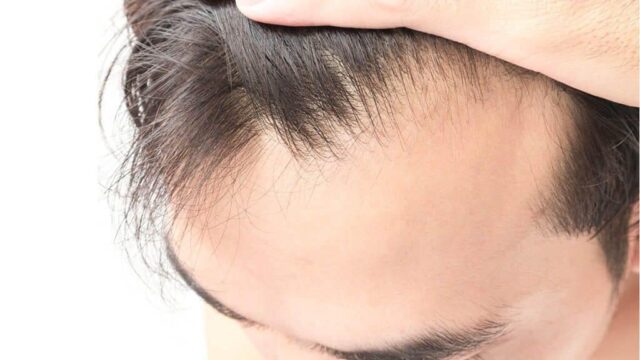Thinning hair is a condition where the hair gradually becomes finer and sparser over time. Unlike baldness, where patches of hair are lost entirely, thinning hair refers to a reduction in the density and volume of hair. This can affect both men and women and can occur for a variety of reasons, leading to a noticeable decrease in the fullness and overall health of the hair. This can be early sign of baldness.
Causes of Thinning Hair
- Genetics: One of the most common causes of thinning hair is genetics. If you have a family history of hair loss, you are more likely to experience thinning hair as you age.
- Hormonal Changes: Hormonal fluctuations, especially during pregnancy, menopause, or due to thyroid issues, can lead to thinning hair. Androgenetic alopecia, a genetic condition, is also influenced by hormones and leads to thinning in both men and women.
- Stress: High levels of stress can lead to a condition known as telogen effluvium, where a large number of hair follicles enter the resting phase, leading to noticeable thinning.
- Poor Nutrition: A lack of essential nutrients like vitamins, minerals, and proteins can weaken hair and lead to thinning. Diets low in iron, biotin, and protein are particularly linked to hair thinning.
- Hair Care Practices: Overuse of heat styling tools, chemical treatments, and tight hairstyles can cause damage to the hair shafts, leading to breakage and thinning over time.
- Medical Conditions: Certain medical conditions, such as alopecia areata, lupus, or scalp infections, can contribute to hair thinning. Medications for conditions like cancer, arthritis, and heart disease can also cause hair thinning as a side effect.
How to Prevent Thinning Hair
While it may not always be possible to completely prevent thinning hair, especially if it’s due to genetics, there are steps you can take to slow down the process and maintain the health of your hair:
- Healthy Diet: If you’re considering hair transplants Manchester, it’s important to maintain a diet rich in vitamins and minerals that support hair health, such as iron, biotin, vitamin D, and omega-3 fatty acids. A balanced diet with plenty of fruit, vegetables, lean protein, and whole grains helps keep your hair strong and healthy.
- Stress Management: Reducing stress through practices like yoga, meditation, regular exercise, and adequate sleep can help prevent stress-related hair thinning.
- Gentle Hair Care: Avoid excessive heat styling, harsh chemical treatments, and tight hairstyles that can lead to hair damage. Use gentle, sulphate-free shampoos and conditioners to maintain a healthy scalp and hair. For long-term solutions to hair loss, consider hair transplants Bristol for natural results.
- Regular Scalp Care: Keep your scalp clean and free of buildup to create a healthy environment for hair growth. Regular scalp massages can also increase blood flow to the hair follicles, promoting healthier hair growth.
- Consider Medications or Treatments: For those experiencing significant thinning, treatments such as Minoxidil (a topical solution) or Finasteride (an oral medication) can help slow hair loss and promote regrowth. Additionally, Platelet-Rich Plasma (PRP) therapy and low-level laser therapy (LLLT) are non-invasive options that support hair health and help prevent further thinning. For more permanent results, hair transplants Walsall are a trusted solution, offering long-lasting restoration for those with advanced hair loss.
- Consult a Professional: If you’re concerned about thinning hair, it’s a good idea to consult a dermatologist or a hair specialist. They can provide a thorough scalp analysis and recommend personalized treatment options based on your specific condition.
Treatments to prevent thinning hair
Thinning hair can be a distressing experience, but understanding its causes and taking proactive steps can help you maintain the health and appearance of your hair. By adopting a healthy lifestyle, practising gentle hair care, and considering medical treatments when necessary, you can effectively manage and even prevent thinning. If you’re noticing signs of hair loss, early intervention is key — and for those exploring long-term solutions, hair transplants in Birmingham may offer an effective option. Don’t hesitate to seek professional advice to protect and preserve your hair.
How UK Hair Transplants (UKHT) Can Help
At UK Hair Transplants (UKHT), we offer comprehensive hair and scalp assessments to determine the extent of thinning hair and provide personalised treatment plans. Our expert team uses advanced non surgical treatments to address hair loss effectively.
Whether you’re in the early stages of hair thinning or experiencing more significant hair loss, UKHT provides a range of solutions to help restore your hair and confidence. Don’t wait until it’s too late—early intervention is key to maintaining a fuller, healthier head of hair. Contact UKHT today to schedule your consultation and take the first step towards regaining control of your hair’s future.


